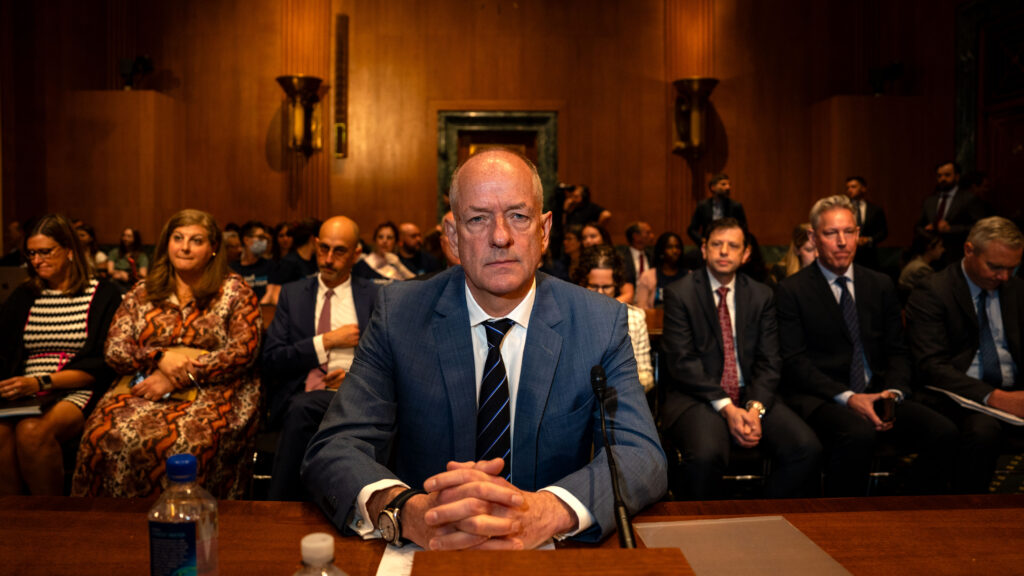You’re reading the web edition of D.C. Diagnosis, STAT’s twice-weekly newsletter about the politics and policy of health and medicine. Sign up here to receive it in your inbox on Tuesdays and Thursdays.
Witty gets no pity
UnitedHealth CEO Andrew Witty was the target of both a Senate and House hearing yesterday, and he faced the full wrath and exasperation of lawmakers angry about the Change Healthcare cyberattack that disrupted payment processing across the country, my colleague Brittany Trang reports.
advertisement
The inquiries went further than just focusing on the attack, and some senators on both sides of the aisle started to ask whether UnitedHealth has become too big to fail.
“In much of what I’ve read about this, you’re kind of saying to the American people, ‘You should feel lucky that we’re big,’” said Senate Finance chair Ron Wyden (D-Ore.), addressing Witty as the hearing concluded. “Well, I think that a lot of Americans today don’t buy that. And I think that your company, on your watch, let the country down.”
Read more from Brittany, who caught a brand-new admission from Witty and a timeline of when patients might hear if they’ve been impacted.
advertisement
Got milk?
In good news for milk drinkers, new FDA and academic studies showed that pasteurization does indeed inactivate the H5N1 bird flu virus, STAT’s Megan Molteni writes.
The testing included milk and other dairy products from 38 states, and bolstered the FDA’s conclusion that it’s still safe to drink milk even amid a widespread bird flu outbreak in dairy cows. Researchers at the Ohio State University and St. Jude’s Children’s Research Hospital also showed pasteurization to be effective.
It’s unclear when the full analysis will be made public, per the FDA announcement.
EcoHealth Alliance on thin ice
Republican lawmakers are pressing to bar the EcoHealth Alliance from federal funds and to be criminally investigated, my co-author Sarah Owermohle writes following a contentious hearing yesterday.
Dual reports released by the select coronavirus subcommittee accuse the group of misrepresenting its work to U.S. federal agencies and failing to report risky studies — that, Republicans and Democrats agree on. However, Democrats stopped short of demanding that the group receive no more federal funding.
The group’s president, Peter Daszak, denied doing gain-of-function research. But while Democrats, at least, made clear that they didn’t think EcoHealth’s research fueled the coronavirus pandemic, neither side of the aisle seemed impressed by his answers on what EcoHealth does do. More here.
A veteran physician-reporter’s tough questions for the presidential candidates
Larry Altman, who has covered the health of every U.S. president since Reagan in his capacity as a medical doctor and former New York Times reporter, spoke with our illustrious executive editor Rick Berke at our D.C. event this week about his biggest unanswered questions for both former President Trump and President Biden.
- For President Biden: “Why do you think so many people think you’re so old when you have demonstrated on television that you can communicate with people… Why from your point of view, do you think people are reacting the way they are?”
- For former President Trump: “Have you kept to the diet at the White House had for you as president, and what effect has that had? Have you lost or gained any weight? If you’ve changed weight, why?… Are you still putting ketchup on everything and are you still eating hamburgers right and left?”
FDA raised concerns about brain biopsies
Mount Sinai has been collecting brain biopsies on live patients for research purposes in a way that the FDA was concerned could introduce “serious risks to the human subjects,” Katherine Eban writes for STAT.
The subjects were vulnerable and may not understand the consequences of losing brain tissue, an FDA review concluded. But the review was apparently never communicated to Mount Sinai and the biopsies continued. The Living Brain Project has collected over 600 brain samples.
Eban investigates statements that Mount Sinai researchers repeatedly made that some neurosurgeons were at least ambiguous, and at worst untrue, about the risk of taking the biopsies.
Balking to avoid backfiring
The Drug Enforcement Agency has reversed a policy that was meant to mitigate shortages of opioids that hospitals commonly use, but that was paradoxically about to make those shortages worse, my colleague John Wilkerson reports.
The DEA sets the quantity of controlled substances that drug companies are allowed to make. Until this year, those quotas were set annually for Schedule II drugs, including morphine and other injectable opioids that hospitals regularly use. The agency said some companies were not manufacturing to the limits of their annual quotas, which was creating shortages, so the DEA tightened the quotas to quarterly amounts to fix that problem.
FDA had approved companies to make those drugs in larger quantities than could be made in quarterly batches. The DEA agreed to revert back to annual quotas for injectable opioids and to set semi-annual quotas for the rest of Schedule II controlled substances.
What we’re reading
- Exercise is good for health — but why? A study in rats offers insight, STAT
- Work requirement will likely delay or invalidate Medicaid expansion in Mississippi, Mississippi Today
- CVS went hard after Medicare Advantage patients, now it’s retreating, STAT
- DeSantis sticks a fork into making or selling lab meat in Florida, Orlando Sentinel

